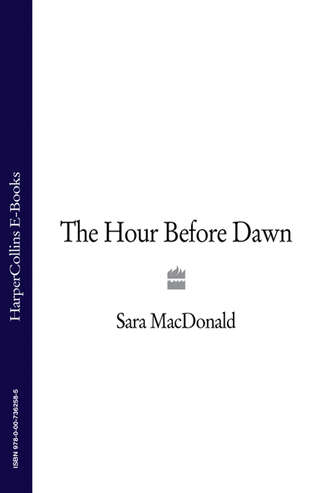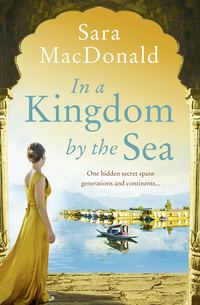
Полная версия
The Hour Before Dawn
A white streak of lightning shot into the night making the children jump back. They all heard but could not see the fourth helicopter drop from the clouds. The engine was making a lot of noise as the pilot searched for the airfield lights below him.
The last helicopter emerged from cloud and circled. Daddy. It seemed to the twins to move nearer to the house, as if to say, I know you’re watching…I’ll be home in thirty minutes, Peapods.
Daddy was always last down. It is like being the captain of a ship, he’d told the twins. Your men’s safety comes first.
They saw the red flickering tail-light against the lightning as the helicopter hovered, tried to turn and drop out of the savage wind to land. But it was impossible. It was caught as the eye of the storm lifted and threw it about the sky like a toy. Pilot and machine were suspended and buffeted against a backdrop of lightning shooting and cracking across the sky like fireworks.
The helicopter looked pathetically small as it was thrown about the sky like an unbalanced bee and tossed this way and that. Fleur and the twins held their breath in hypnotised terror.
‘Land, Daddy. Land!’ Saffie cried out into the night. Nikki gripped the windowsill as they watched the tail rising, tail-blade whirring frantically as the engine screamed.
‘Holy Mary, mother of God…Please…’ Fleur was crying over and over. She clutched the twins, held them into her, gripped them so tightly she hurt, and her eyes never left the sky.
‘David…David…I’m willing you down…You can do it. I know you can do it…Come on, David…please, darling, get her down…’
Something terrible was gripping Saffie’s stomach in a cramp so painful she wanted to fall to the ground. Nikki was sobbing, still clutching the windowsill. They were only five but they both knew, like their mother, that their father was powerless to do anything to save himself, because he no longer had control of his machine, which was turning upside down and falling out of the sky and spiralling down to the ground so fast that if they’d blinked they would have missed it.
Already, far away, they could hear the sound of sirens. They heard the explosion as the aircraft hit the ground when it was out of sight. They saw the flames leap upwards into a sky cracking with thunder. They could not move, Fleur, Saffie and Nikki. They stood watching the sky where the helicopter had been a moment ago.
A long way away a telephone was ringing and Ah Heng ran in her little backless slippers to answer it. Still, the three figures stood, unable to take their eyes from the empty sky that was growing light now. The rain blew in great gusts sideways, filling the monsoon drains, flushing the snakes out of the dry collected leaves.
Into the dawn, low on the horizon, there suddenly sailed one small pink cloud. Fleur stared and stared at it. She said in a strange thick voice, ‘Twins…look…see? That cloud…Daddy will always be there to look after us. Always.’
Saffie reached behind Fleur for Nikki’s hand. They stared at the cloud in silence, their small bodies trembling, unable to entirely comprehend that their father was so suddenly dead. They did not want a pink cloud. They wanted their big, laughing, silly, whiskery, safe daddy, who called out each and every day, ‘Hey! I’m home! Where are my little peapods?’
Far away on the Chitbee Road they could see the military car containing the padre and the commandant and the military police making its way down the long road to their house.
‘Missie?’ Ah Heng touched Fleur’s arm, took the twins gently from her, holding them to her. ‘You come away from window now. You cold. You come away. I make Missie tea. Army men coming.’
But Fleur could not take her eyes from the cloud that was fading to orange and had only been the reflected colour of the flames.
‘You will always be with us to keep us safe,’ the twins heard her whisper. ‘Oh, David…David.’
But their father was not there to keep them safe. Did Nikki blame Fleur for what happened later? Was she angry with her? Yes, she was. If you had children you must look after them, no matter what happened to you or however sad you were. You must look after them and keep them safe forever, because you were their mother and if you didn’t, who would?
FOUR
‘What time is your mother’s flight from Auckland?’ Jack asked me at breakfast. He was standing at the sink, buttering toast.
‘Five o’clock, I think. I’m going to check in a minute. It’s OK, Jack. I can meet her on my own.’
‘No, Nik, we’ll both go. I’ll make sure I’ve finished by four; it will give us an hour to get there. Just be ready, we don’t want her standing around jetlagged waiting for us. Did you tell her to stay in the main airport until it’s time for the flight to Kerikeri? That other terminal is the pits.’
‘Yes. I e-mailed. It’ll be a miracle if she’s got to Auckland and not sailed off to Hong Kong by mistake…’ I joked weakly. ‘I don’t think she’s travelled so far on her own for a long time.’
Jack gave me one of his looks. ‘Well, she’s had the courage to stop off in Singapore on her own so she can’t be quite as dumb as you make out…’ He paused and I waited. ‘Your Mom is staying two nights, just two nights, Nik. Surely it can’t be too hard to be nice to her for a fleeting visit.’
He’s right, it shouldn’t be too hard, but it will be.
I was aware that the fault lay with me, that I was carrying a perceived injury long after it should have healed, that my feelings were immature, to say the least, in someone of my age. I wasn’t a teenager, for heaven’s sake. But there are some people who are so different from you that they get under your skin and make you itch as soon as they appear. My mother is one of those people.
‘Will you try,’ Jack kissed me, his mouth full of crumbs, ‘to be kind? Or it’s going to be embarrassing, especially as she’s meeting me for the first time.’
‘Of course,’ I said, ‘Pollyanna is my middle name.’
‘Who?’
I grinned at him. ‘Just an American goody-goody schoolgirl book.’
When Jack had gone I wandered round the house tidying, trying to see all we had done here with my mother’s eyes. Then I took towels up to the spare room, which had its own balcony, and I looked out over the bay and then stared down at the bed my mother would sleep in. It seemed strange to think of someone I hadn’t seen for over three years lying there tonight.
Disturbing; a sudden mix of my two, so different, lives. One I had wanted to leave behind me, so that I could be born anew, slough off that old teenage skin and turn into someone else, perhaps the person I was now. I had come so far, to another culture and another continent, and it seemed suddenly as if my mother was following me, as if to remind me of the shadows I left and the person I once was. I didn’t want to be reminded.
The baby was moving now and I could feel the tiny flutter of life; a small, tentative movement to alert me to his presence, his curled life within me, slowly growing into the person he will be. And the person he will be will want to know his family and his English roots and his grandmother.
I knew, in the moment I stood by the bed my mother would sleep in, that I wanted them to know each other. I couldn’t deprive either of a relationship I had needed in my childhood.
I stared out to the yachts in the bay, beyond the garden Jack and I had created out of jungle, and remembered how hard I sometimes thought my grandmother was on my mother, yet I could do no wrong. I went out onto the balcony and breathed deeply, the sun warm on my face, and I swore that I would try my hardest to welcome my mother. She was obviously lonely without Fergus and seemed to have thrown herself into painting and studying the history of art.
I smiled. Fleur was quite brave really, to start again on something new at her age. I will be nice. I will. Jack was right, it was time to move on. After all, I didn’t know when I’d see her again.
I went downstairs and put my hat on against the sun and set off for my jungle trail. We had joined an experiment to cull the possums. They were ripping the trees to pieces and Jack and I had placed poison as small enticements, fixed to the trunks of trees.
I wished they weren’t so cute. I wished they looked like rats and then I wouldn’t feel so bad. But I knew it had to be done, we had more than enough stripped trees that were going to die on our land.
As I walked I felt a sense of achievement; it was an adventure, this life I shared with Jack. There were years ahead of us, preserving and finding new ways of conserving land that could never be tamed, nor would we want it to be. All these acres were becoming familiar, becoming home after years of nomadic existence. I never thought I could settle anywhere.
I hadn’t planned to get pregnant, although I knew time was ticking. There was so much to do and pregnancy had reined me in. Jack’s face was enough, though, when I’d told him. So instead of gardening in the heat I could only walk round checking things, feeding the hens and gently weeding up near the house, planting rows of vegetables that struggled in the poor soil.
As if by some tacit agreement, neither Jack nor I mentioned it to each other, but we both wondered if our time here would have to come to an end with a child. We lived in the middle of nowhere, miles away from a doctor, school or human habitation. Children needed other children and I didn’t want an only child, which is what I had become.
The horror and the loneliness when Saffie disappeared was like losing a limb that went on twitching with the loss of the other half of me.
I feel it, even now.
FIVE
Fleur woke early on the day of her flight to Singapore. She never drew her curtains and she saw it was the most beautiful day. The leaves of the tree outside were motionless. The day seemed to be holding its breath. A blackbird sang clear into the morning against the growl of cars in the distance as the city woke up. It felt like the first day of spring.
Fleur lay looking round her room, where the sun slanted across the floor highlighting the dust motes which hung and floated in the air. She felt a strange sad-happiness, when to be alive was almost enough in the moment of a bird singing; in the moment of sunlight on your hands; in the small awareness of yourself in a new day.
Since Fergus died she had learnt to be still and treasure these mornings, waking alone and listening, really listening, both to the sounds of a world waking up and to herself. The first moments of the day could reveal feelings she could not articulate or write down, but would sometimes attempt to capture in paint.
A lack of professional technique – for Fleur thought of herself as an apprentice – could not hide the intensity behind her paintings. A fleeting spiritual second could transform a simple painting into a canvas that people stood in front of and gazed at, captivated by the power with which Fleur captured the enormity of loss alongside the budding awareness of something beyond herself that went on moving and growing within her.
The loss of a child ended innocence. To be pre-deceased by your child was the worst that could happen to a parent. It took a lifetime of walking towards a hope of understanding to realise that there was nothing to understand. Sense could never be made of a random wicked and meaningless act. This was the bleak knowledge you carried all your life like a second self, buried, but always with you.
Fleur, triggered by the sudden loss of Fergus, found that she could suddenly translate this knowledge into colour and texture and turn it into something people could relate to. Something they felt in the core of themselves, in the pit of their stomachs, in the ache of their throats as they stood staring at her large, brightly coloured landscapes full of heat and bustle. Their eyes drawn to the one small object or person within the picture that stood quite separate and alone.
Fleur did not know from where her inspiration came. Only that it came from some unexplored source and she painted fast and concentrated, to the exclusion of all else, in the silent nights and into the pale, cold dawn of another day.
As she lay staring at the tree outside her window, she felt as if she had already left this small terraced house and begun her journey of discovery to her daughter and to Hundertwasser’s architecture, all without corners, all without angles, all part of the earth and its constant cycle of rebirth. She was aware of why she was drawn to his philosophy and architecture; it was connected indivisibly to her need for reparation with her daughter.
She felt in those first moments of sunlight that she might not return to this small house that she had shared with Fergus for so many years, or that even if she did, everything would be different, never quite the same again. Unease stirred, but she also had the sensation of moving inexorably towards something dark but necessary; that nebulous feeling that something was going to happen.
She got out of bed and pulled on Fergus’s towelling robe, caught the scent from a vase of freesias the gallery had sent, which stood on her dressing table. All part of this safe life she led. She padded downstairs and drew back the sittingroom curtains. The man next door was wheeling his bicycle down his path, pausing at the gate as he always did to fix his cycle clips. The teacher two doors down was gunning the reluctant engine of her Fiesta. Fleur found she was listening for it to start and thinking, This time tomorrow I will be in Singapore.
Fleur looked down across the glinting wing of the plane onto acres of perfect white cloud the texture of fluffy mashed potato. She remembered as a child the thrill of believing those clouds were solid enough to sit on, that she could have jumped from one floury cushion to another.
The mystery of land mass, ocean and sky from a height never left her. The changing patterns and shape of mountains and desert and the progress of herself encapsulated in tons of moving metal remained a wonder of human engineering.
It was as if, once airborne, between lives and destinations, all normal, taken-for-granted things were rendered, by stress or fatigue, abnormal. As if she was circled by an odd tight silence, worn like a cloak to distance herself, making her progress, a stranger among strangers, infinitely obscure.
Travelling forward through time, arriving thousands of miles into an unfamiliar or distant landscape of tomorrow, imbued Fleur with an almost catatonic immobility and invisibility. She neither moved nor undid her seatbelt but sat and stared out at the wondrous mass of virgin cloud.
An old man on the aisle seat was telling the woman between them how he had built the pipeline down in the vast dry expanse of desert below them in Dubai. For thirteen years he had toiled in the unforgiving sun, taking water to the Bedouins. His skin told the truth of an engineer’s harsh life in the sun. Unmistakable patches of skin cancer marked his hands and face like a badge of office.
Normally Fleur would have been fascinated by his reminiscing, but she wanted to remain in her no-man’s land, devoid of social interaction, the telling of stories, the re-telling of lives. She loved it when the lights went out, when the blinds went down against the night outside and she could lie tiredly listening to the rustle of passengers, the dull plom of the bell as they asked for drinks, the swish of recycled air around the cabin, as inexorably they ploughed through the night sky to Singapore.
Singapore and another life. She thought of David, tried to conjure his face, his voice. But they would not come or came blurred like an unfocused faded photograph. The city contained so much that had been a part of her young life. She had spent time there as a child and a young adult. She had returned there a married woman, carrying the baby twins.
So much happiness. A beautiful couple who had it all. Then, those small, relentless steps that led slowly but surely to tragedy.
Snatches of lines from somewhere popped into Fleur’s head…
When the train starts, and the passengers are settled[…]To the sleepy rhythm of a hundred hours.Fare forward, travellers! not escaping from the pastInto different lives, or into any future;You are not the same people who left that stationOr who will arrive at any terminus
A sense of smell could unlock memories faster than the blink of an eye. Fleur could not tell what would leap out at her when she stepped into the shimmering heat and smell of a city where so much of her life had unfurled faster than she had had the wit to stop it.
SIX
Singapore, 1966
When Fleur saw David for the first time he was sitting on the edge of the pool at the Tanglin Club in Singapore City. She thought he was possibly the most graceful man she had ever seen. After her brother and the spotty youths she had travelled out from England with he seemed like a god.
She was fifteen and home for the long summer holidays. Her father, Peter Llewellyn, was colonel of a regiment on a three-year posting to Singapore. It was his second posting to the Far East and Fleur and her brother, Sam, had grown blasé with flying back and forth from boarding school in England. It was Singapore that felt like home.
They had both pretty much done their own thing that summer as their mother, Laura, bored with army life, was studying for an Open University degree, and she trusted Sam to keep an eye on Fleur.
David was on his first posting as a subaltern. He was dark and immensely charismatic rather than good-looking and he always seemed surrounded by teachers, nurses, or young service wives. He noticed Fleur, however, watching him covertly. She was still all angles, like a colt, but she walked like a ballet dancer and had a hint of the exotic, even at fifteen.
Fleur had her mother Laura’s dark skin, inherited from a French grandmother, that tanned easily, and a way of rolling up her hair like her mother in a quick and particular French way. Sam’s skin was fair like his father’s and he moaned about it.
Fleur loved the water and both she and Sam were excellent swimmers having been taught professionally by a Singaporean coach. Peter had insisted on lessons for both his children as he loved sailing. People would stop what they were doing to watch Fleur dive. She would take time to position her limbs in the same way she perfected her dance steps, and once committed her body would arch and spring and break the water almost soundlessly.
David thought her dive was the most perfect thing he had ever seen. He watched her shrugging off Sam’s friends and the schoolboys of her own age. She seemed perfectly self-contained and content with her own company. He was amused to see that, young as she was, she attracted the attention of the young naval officers who sailed into the naval base on the frigates, as well as the young army and RAF officers serving in Singapore.
They were all fairly cautious for she was the colonel’s daughter, but Peter Llewellyn was not a fierce man, he was more like a vague scientist than an army officer. He was popular with his subalterns, and underneath his slightly bumbling exterior lay a first-class brain.
At weekends the family would drive down to the naval base for the swimming pool, evening barbecues, and films. It was less stuffy than the Tanglin Club, which had more than its fair share of aging expats and high-ranking service wives who loved rules.
The Officers Club with a large pool faced out to the Straits of Malacca and looked down on the harbour and dry dock below. When the frigates were in, the navy would throw constant parties and Fleur never lost the thrill of being piped aboard. She would walk with Laura in front of Sam and her father, male eyes swivelled their way. The ships were often at sea for some time and any woman from fifteen to fifty was made to feel glamorous and witty. Sam was allowed to drink moderately as he was nearly eighteen. Fleur was not and Laura watched her like a hawk.
It was an incident at a cocktail party on board a small naval frigate that brought David and Fleur together. As they were piped aboard the sun hung low over the Straits, the sky flaring and fired by scarlet and orange. When darkness came, it came swiftly: no dusk, just velvety blackness. Fleur and Sam stood with a group of young sub-lieutenants drinking on the top deck. Her brother was eagerly discussing sailing, and Fleur, a little awed by so much attention, was swallowing a mixed-fruit cocktail rather fast as she practised the art of flirting.
She caught sight of her parents circulating from time to time and was impressed with her mother’s practised habit of throwing back her dark hair and laughing hugely; of putting a hand lightly on a young man’s arm and leaning towards him to catch his words, as if he was the most fascinating man in the room.
Fleur wasn’t quite ready for that yet, but she did practise the head-tossing and smiling up into young, tanned faces. The more glasses of fruit juice she had the better she seemed to get at this. A small warm wind blew in to the harbour bringing with it the smell of spices and petrol and rotting vegetation. A plump sub-lieutenant kept topping her up from a jug snatched from a passing waiter. Sam, suddenly aware of Fleur flushed and laughing louder than usual, moved over to her.
‘Fleur, you’re not drinking, are you?’
‘No. Just fruit juice and mint. Promise.’
‘OK.’ He looked at her closely for a second and then turned back to the group of young men. Fleur leant over the rail and looked down at the dark water. It looked invitingly cool.
‘Do you ever swim from the ship?’ she asked one of the naval officers.
‘Bit of a way down,’ the plump one said, laughing. ‘It’s not that far,’ Fleur replied.
Plump officer stared at her lazily. ‘I can’t see a girl doing
it.’
Fleur looked down, feeling dizzy, but it did not seem that much of a leap. No more than a diving board. She moved forward away from the crush of people.
‘You think I’m too scared to jump?’
‘I’ll put a bet on it.’
The other officers stirred uneasily. ‘Come on, let’s go below and get something to eat, Fleur. Take no notice of Billy Bunter.’
‘Of course she won’t take any notice. She’s a girl.’
Fleur moved fast, climbed the rail and put both her legs over. She wasn’t going to dive because her skirt would come up over her head and that would be undignified. She felt no fear at all, just exhilaration. She leapt into space.
The officers hurtled to the rail and looked down. One moved to the jug and picked it up and smelt it.
‘You stupid bastard! You’ve been giving her Pimms. She’s only a kid…’
David, making his way towards the group, saw Fleur leap over the side and plummet downwards. He took in the empty Pimms jug and the guilty and furtive fat officer. Fleur hit the water and disappeared. Someone was already undoing a lifebuoy. David leant over the rail with the other men, waiting for her head to appear. It did not.
Fleur, plummeting through dark water, wondered vaguely but without panic why she was still effortlessly headed downwards. It was not an unpleasant feeling, just interesting.
David threw his jacket off and dived, closely followed by the fat officer and Sam.
Everyone else held their breath. Senior ranks, alerted, moved to the rail with sudden alarm, demanding to know what the hell was going on.
Underwater, David saw Fleur now beginning to rise to the surface. He grabbed her and hauled her upwards, helped by the fat officer. As her head rose above the water she sobered abruptly, took a huge shaky breath, choking.
Sam grabbed her under her armpits and kicked his way back to the ladder, where two naval ratings lifted her up onto the deck and wrapped her in a blanket. Laura bent to her daughter, relieved, angry and embarrassed in equal measure.






